A Comprehensive Review: Importance of Ethics in Healthcare Practice
VerifiedAdded on 2023/06/08
|6
|1317
|461
Essay
AI Summary
This essay discusses the importance of ethics in healthcare practice, emphasizing the fundamental principles of beneficence, non-maleficence, autonomy, and justice. It highlights the dual nature of morality, distinguishing between common and particular moral values, and underscores the physician's responsibility to prioritize patient benefit, avoid harm, and respect patient autonomy. The essay presents case studies illustrating ethical dilemmas, such as a college student refusing treatment and a son withholding information from his mother about a cancer diagnosis. It concludes that ethics is an inseparable component of clinical practice, crucial for navigating complex healthcare decisions and upholding patient rights while promoting fair and equitable treatment.
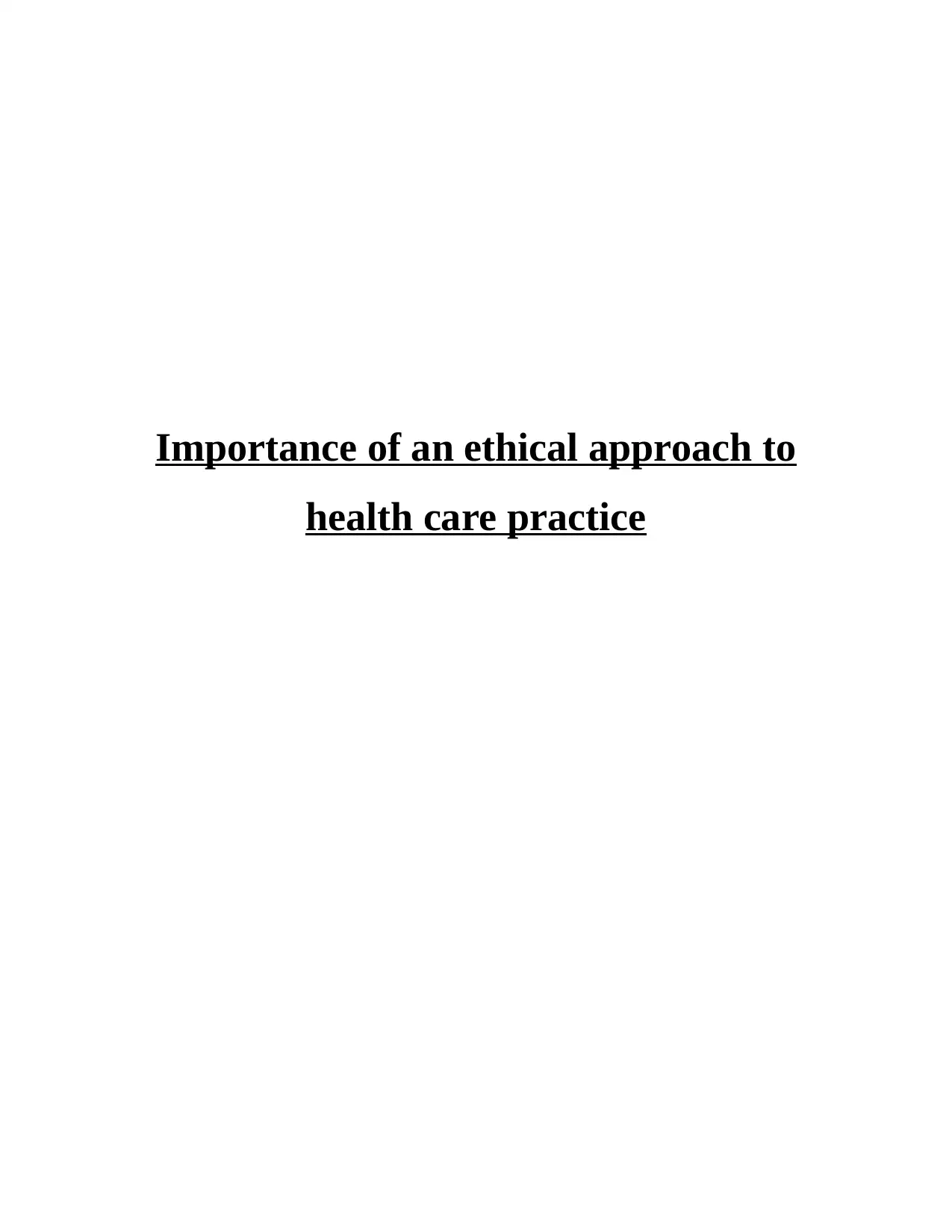
Importance of an ethical approach to
health care practice
health care practice
Paraphrase This Document
Need a fresh take? Get an instant paraphrase of this document with our AI Paraphraser
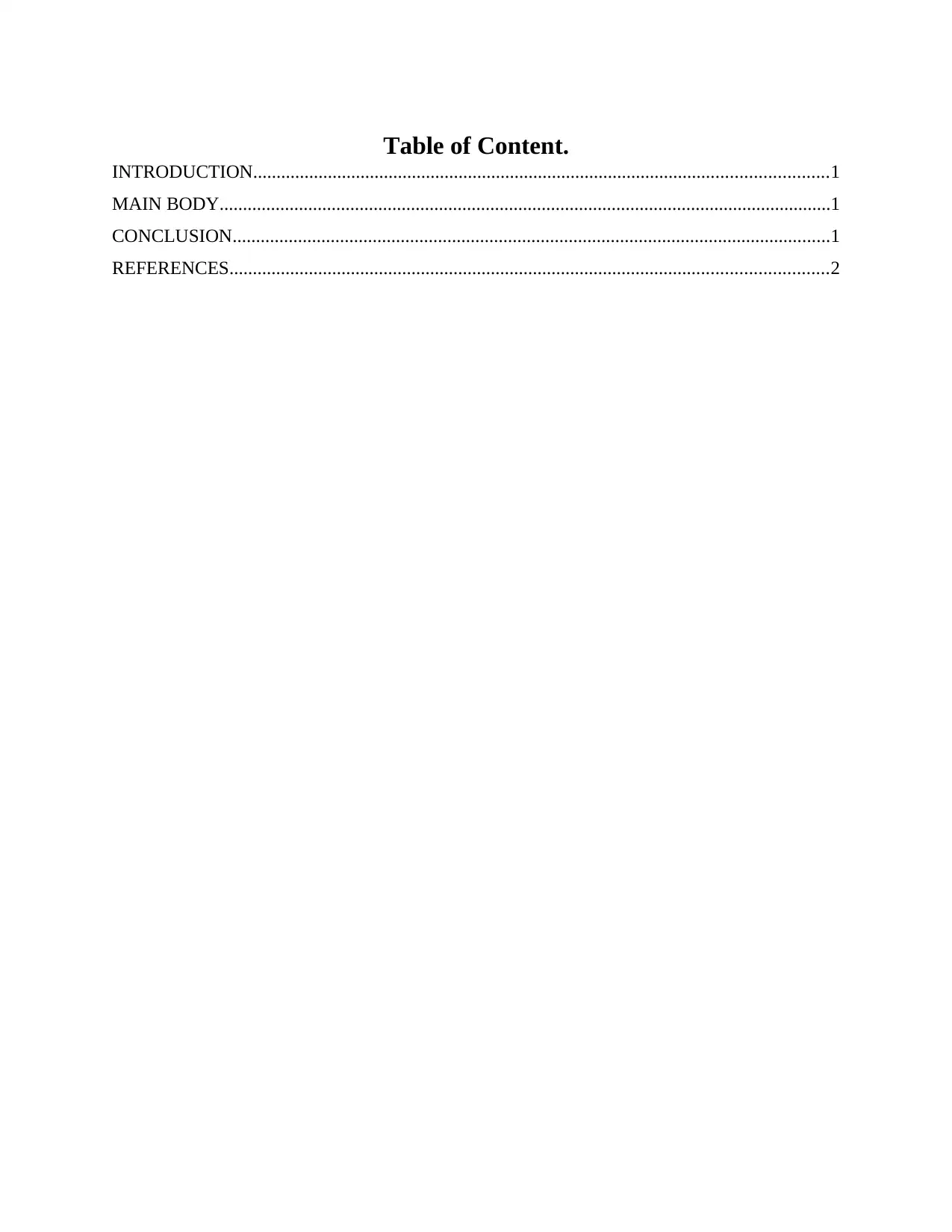
Table of Content.
INTRODUCTION...........................................................................................................................1
MAIN BODY...................................................................................................................................1
CONCLUSION................................................................................................................................1
REFERENCES................................................................................................................................2
INTRODUCTION...........................................................................................................................1
MAIN BODY...................................................................................................................................1
CONCLUSION................................................................................................................................1
REFERENCES................................................................................................................................2
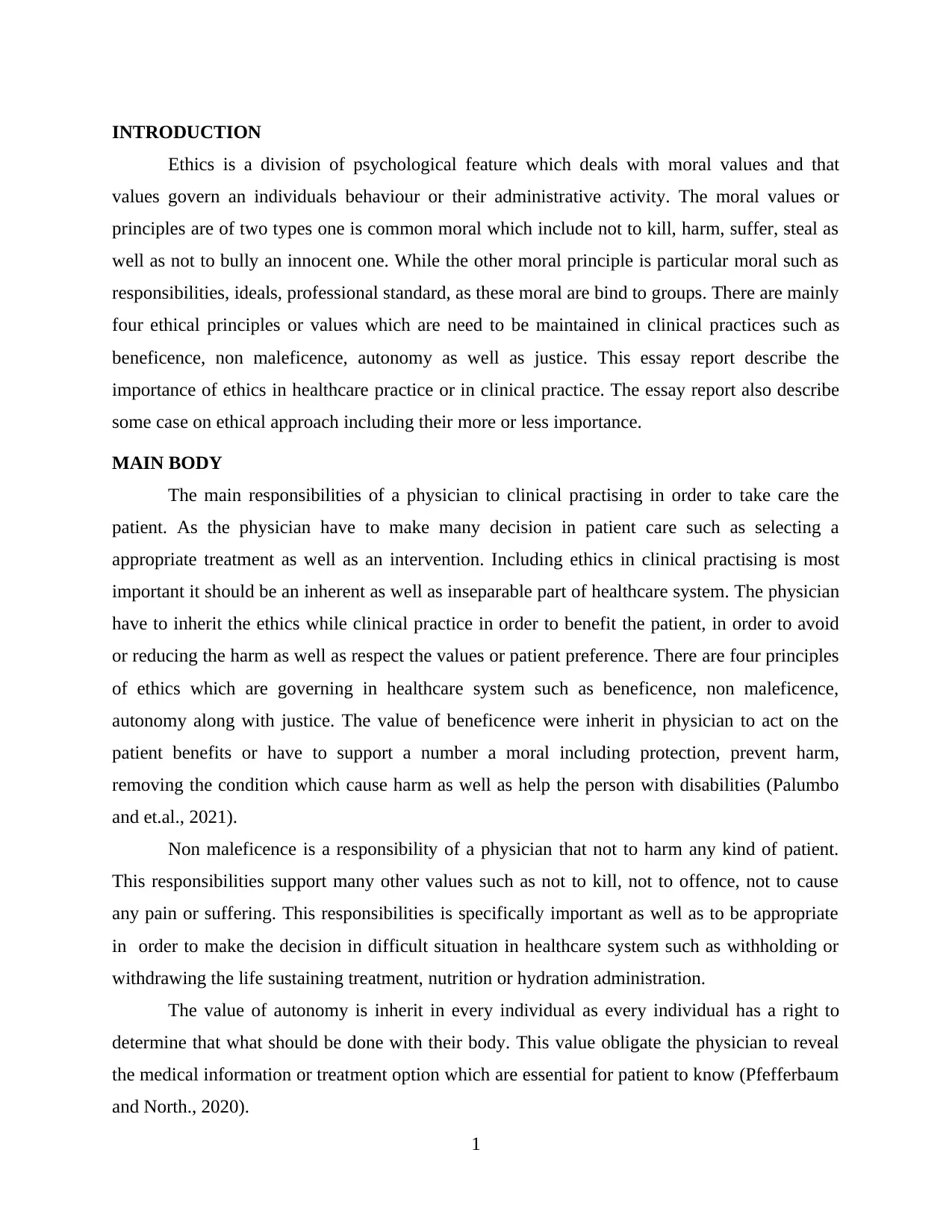
INTRODUCTION
Ethics is a division of psychological feature which deals with moral values and that
values govern an individuals behaviour or their administrative activity. The moral values or
principles are of two types one is common moral which include not to kill, harm, suffer, steal as
well as not to bully an innocent one. While the other moral principle is particular moral such as
responsibilities, ideals, professional standard, as these moral are bind to groups. There are mainly
four ethical principles or values which are need to be maintained in clinical practices such as
beneficence, non maleficence, autonomy as well as justice. This essay report describe the
importance of ethics in healthcare practice or in clinical practice. The essay report also describe
some case on ethical approach including their more or less importance.
MAIN BODY
The main responsibilities of a physician to clinical practising in order to take care the
patient. As the physician have to make many decision in patient care such as selecting a
appropriate treatment as well as an intervention. Including ethics in clinical practising is most
important it should be an inherent as well as inseparable part of healthcare system. The physician
have to inherit the ethics while clinical practice in order to benefit the patient, in order to avoid
or reducing the harm as well as respect the values or patient preference. There are four principles
of ethics which are governing in healthcare system such as beneficence, non maleficence,
autonomy along with justice. The value of beneficence were inherit in physician to act on the
patient benefits or have to support a number a moral including protection, prevent harm,
removing the condition which cause harm as well as help the person with disabilities (Palumbo
and et.al., 2021).
Non maleficence is a responsibility of a physician that not to harm any kind of patient.
This responsibilities support many other values such as not to kill, not to offence, not to cause
any pain or suffering. This responsibilities is specifically important as well as to be appropriate
in order to make the decision in difficult situation in healthcare system such as withholding or
withdrawing the life sustaining treatment, nutrition or hydration administration.
The value of autonomy is inherit in every individual as every individual has a right to
determine that what should be done with their body. This value obligate the physician to reveal
the medical information or treatment option which are essential for patient to know (Pfefferbaum
and North., 2020).
1
Ethics is a division of psychological feature which deals with moral values and that
values govern an individuals behaviour or their administrative activity. The moral values or
principles are of two types one is common moral which include not to kill, harm, suffer, steal as
well as not to bully an innocent one. While the other moral principle is particular moral such as
responsibilities, ideals, professional standard, as these moral are bind to groups. There are mainly
four ethical principles or values which are need to be maintained in clinical practices such as
beneficence, non maleficence, autonomy as well as justice. This essay report describe the
importance of ethics in healthcare practice or in clinical practice. The essay report also describe
some case on ethical approach including their more or less importance.
MAIN BODY
The main responsibilities of a physician to clinical practising in order to take care the
patient. As the physician have to make many decision in patient care such as selecting a
appropriate treatment as well as an intervention. Including ethics in clinical practising is most
important it should be an inherent as well as inseparable part of healthcare system. The physician
have to inherit the ethics while clinical practice in order to benefit the patient, in order to avoid
or reducing the harm as well as respect the values or patient preference. There are four principles
of ethics which are governing in healthcare system such as beneficence, non maleficence,
autonomy along with justice. The value of beneficence were inherit in physician to act on the
patient benefits or have to support a number a moral including protection, prevent harm,
removing the condition which cause harm as well as help the person with disabilities (Palumbo
and et.al., 2021).
Non maleficence is a responsibility of a physician that not to harm any kind of patient.
This responsibilities support many other values such as not to kill, not to offence, not to cause
any pain or suffering. This responsibilities is specifically important as well as to be appropriate
in order to make the decision in difficult situation in healthcare system such as withholding or
withdrawing the life sustaining treatment, nutrition or hydration administration.
The value of autonomy is inherit in every individual as every individual has a right to
determine that what should be done with their body. This value obligate the physician to reveal
the medical information or treatment option which are essential for patient to know (Pfefferbaum
and North., 2020).
1
⊘ This is a preview!⊘
Do you want full access?
Subscribe today to unlock all pages.

Trusted by 1+ million students worldwide
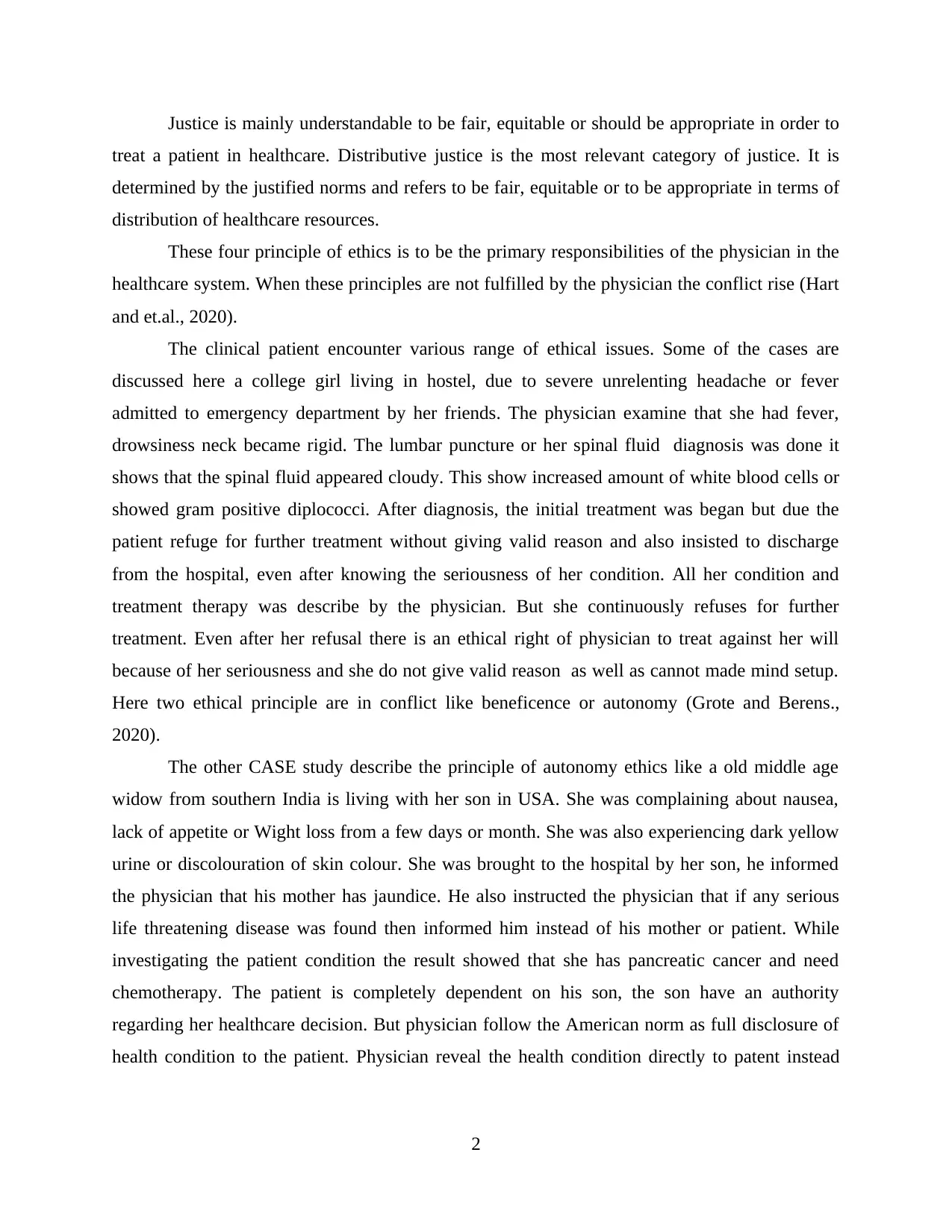
Justice is mainly understandable to be fair, equitable or should be appropriate in order to
treat a patient in healthcare. Distributive justice is the most relevant category of justice. It is
determined by the justified norms and refers to be fair, equitable or to be appropriate in terms of
distribution of healthcare resources.
These four principle of ethics is to be the primary responsibilities of the physician in the
healthcare system. When these principles are not fulfilled by the physician the conflict rise (Hart
and et.al., 2020).
The clinical patient encounter various range of ethical issues. Some of the cases are
discussed here a college girl living in hostel, due to severe unrelenting headache or fever
admitted to emergency department by her friends. The physician examine that she had fever,
drowsiness neck became rigid. The lumbar puncture or her spinal fluid diagnosis was done it
shows that the spinal fluid appeared cloudy. This show increased amount of white blood cells or
showed gram positive diplococci. After diagnosis, the initial treatment was began but due the
patient refuge for further treatment without giving valid reason and also insisted to discharge
from the hospital, even after knowing the seriousness of her condition. All her condition and
treatment therapy was describe by the physician. But she continuously refuses for further
treatment. Even after her refusal there is an ethical right of physician to treat against her will
because of her seriousness and she do not give valid reason as well as cannot made mind setup.
Here two ethical principle are in conflict like beneficence or autonomy (Grote and Berens.,
2020).
The other CASE study describe the principle of autonomy ethics like a old middle age
widow from southern India is living with her son in USA. She was complaining about nausea,
lack of appetite or Wight loss from a few days or month. She was also experiencing dark yellow
urine or discolouration of skin colour. She was brought to the hospital by her son, he informed
the physician that his mother has jaundice. He also instructed the physician that if any serious
life threatening disease was found then informed him instead of his mother or patient. While
investigating the patient condition the result showed that she has pancreatic cancer and need
chemotherapy. The patient is completely dependent on his son, the son have an authority
regarding her healthcare decision. But physician follow the American norm as full disclosure of
health condition to the patient. Physician reveal the health condition directly to patent instead
2
treat a patient in healthcare. Distributive justice is the most relevant category of justice. It is
determined by the justified norms and refers to be fair, equitable or to be appropriate in terms of
distribution of healthcare resources.
These four principle of ethics is to be the primary responsibilities of the physician in the
healthcare system. When these principles are not fulfilled by the physician the conflict rise (Hart
and et.al., 2020).
The clinical patient encounter various range of ethical issues. Some of the cases are
discussed here a college girl living in hostel, due to severe unrelenting headache or fever
admitted to emergency department by her friends. The physician examine that she had fever,
drowsiness neck became rigid. The lumbar puncture or her spinal fluid diagnosis was done it
shows that the spinal fluid appeared cloudy. This show increased amount of white blood cells or
showed gram positive diplococci. After diagnosis, the initial treatment was began but due the
patient refuge for further treatment without giving valid reason and also insisted to discharge
from the hospital, even after knowing the seriousness of her condition. All her condition and
treatment therapy was describe by the physician. But she continuously refuses for further
treatment. Even after her refusal there is an ethical right of physician to treat against her will
because of her seriousness and she do not give valid reason as well as cannot made mind setup.
Here two ethical principle are in conflict like beneficence or autonomy (Grote and Berens.,
2020).
The other CASE study describe the principle of autonomy ethics like a old middle age
widow from southern India is living with her son in USA. She was complaining about nausea,
lack of appetite or Wight loss from a few days or month. She was also experiencing dark yellow
urine or discolouration of skin colour. She was brought to the hospital by her son, he informed
the physician that his mother has jaundice. He also instructed the physician that if any serious
life threatening disease was found then informed him instead of his mother or patient. While
investigating the patient condition the result showed that she has pancreatic cancer and need
chemotherapy. The patient is completely dependent on his son, the son have an authority
regarding her healthcare decision. But physician follow the American norm as full disclosure of
health condition to the patient. Physician reveal the health condition directly to patent instead
2
Paraphrase This Document
Need a fresh take? Get an instant paraphrase of this document with our AI Paraphraser
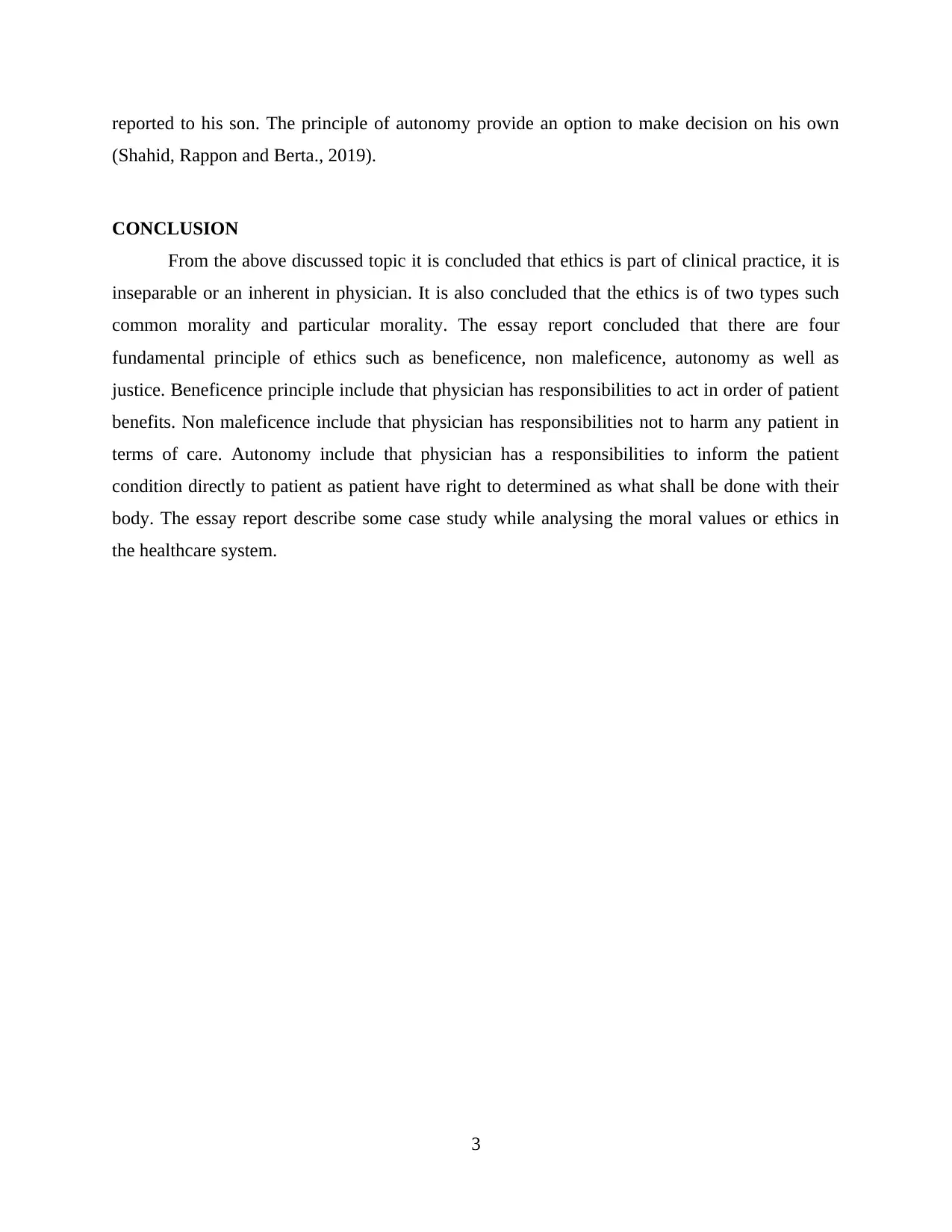
reported to his son. The principle of autonomy provide an option to make decision on his own
(Shahid, Rappon and Berta., 2019).
CONCLUSION
From the above discussed topic it is concluded that ethics is part of clinical practice, it is
inseparable or an inherent in physician. It is also concluded that the ethics is of two types such
common morality and particular morality. The essay report concluded that there are four
fundamental principle of ethics such as beneficence, non maleficence, autonomy as well as
justice. Beneficence principle include that physician has responsibilities to act in order of patient
benefits. Non maleficence include that physician has responsibilities not to harm any patient in
terms of care. Autonomy include that physician has a responsibilities to inform the patient
condition directly to patient as patient have right to determined as what shall be done with their
body. The essay report describe some case study while analysing the moral values or ethics in
the healthcare system.
3
(Shahid, Rappon and Berta., 2019).
CONCLUSION
From the above discussed topic it is concluded that ethics is part of clinical practice, it is
inseparable or an inherent in physician. It is also concluded that the ethics is of two types such
common morality and particular morality. The essay report concluded that there are four
fundamental principle of ethics such as beneficence, non maleficence, autonomy as well as
justice. Beneficence principle include that physician has responsibilities to act in order of patient
benefits. Non maleficence include that physician has responsibilities not to harm any patient in
terms of care. Autonomy include that physician has a responsibilities to inform the patient
condition directly to patient as patient have right to determined as what shall be done with their
body. The essay report describe some case study while analysing the moral values or ethics in
the healthcare system.
3
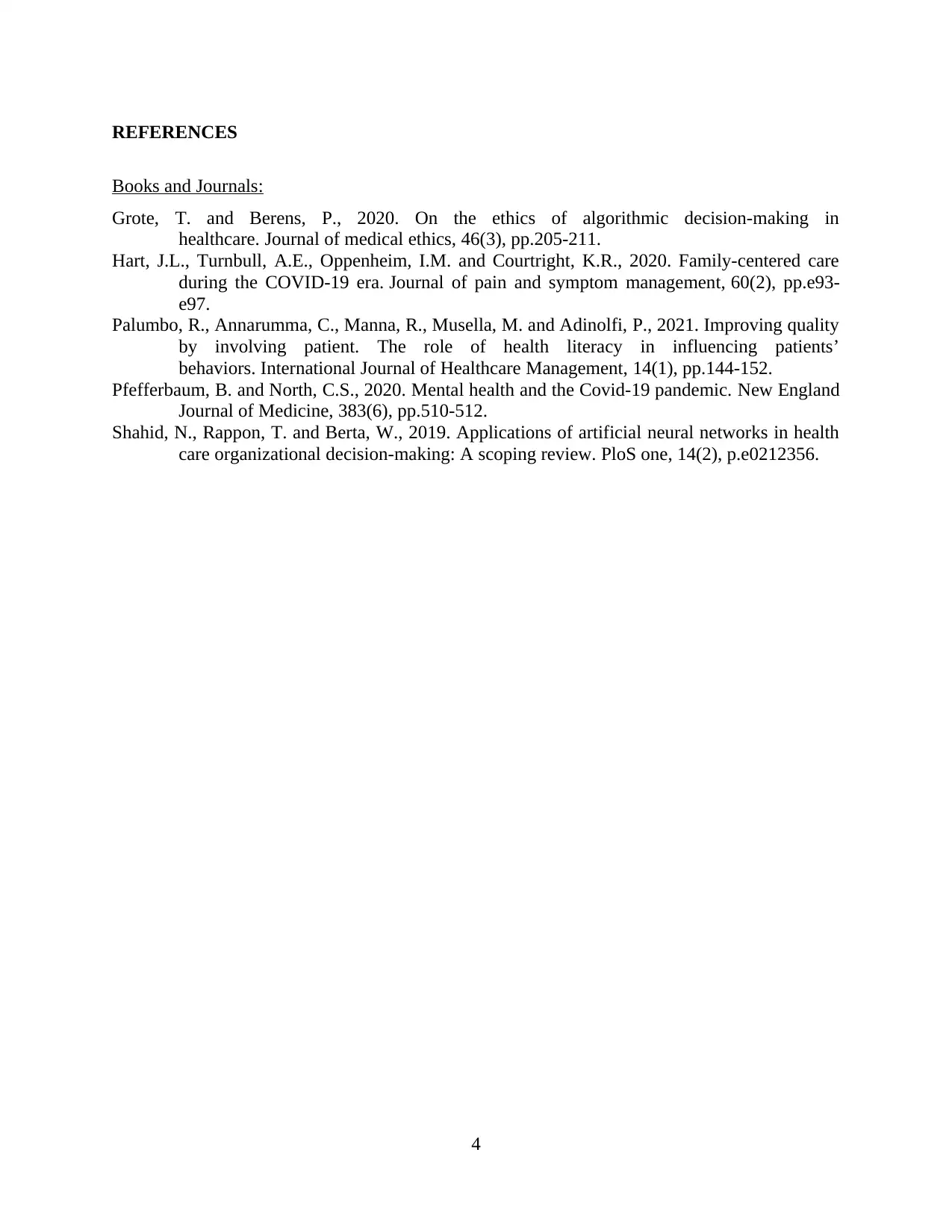
REFERENCES
Books and Journals:
Grote, T. and Berens, P., 2020. On the ethics of algorithmic decision-making in
healthcare. Journal of medical ethics, 46(3), pp.205-211.
Hart, J.L., Turnbull, A.E., Oppenheim, I.M. and Courtright, K.R., 2020. Family-centered care
during the COVID-19 era. Journal of pain and symptom management, 60(2), pp.e93-
e97.
Palumbo, R., Annarumma, C., Manna, R., Musella, M. and Adinolfi, P., 2021. Improving quality
by involving patient. The role of health literacy in influencing patients’
behaviors. International Journal of Healthcare Management, 14(1), pp.144-152.
Pfefferbaum, B. and North, C.S., 2020. Mental health and the Covid-19 pandemic. New England
Journal of Medicine, 383(6), pp.510-512.
Shahid, N., Rappon, T. and Berta, W., 2019. Applications of artificial neural networks in health
care organizational decision-making: A scoping review. PloS one, 14(2), p.e0212356.
4
Books and Journals:
Grote, T. and Berens, P., 2020. On the ethics of algorithmic decision-making in
healthcare. Journal of medical ethics, 46(3), pp.205-211.
Hart, J.L., Turnbull, A.E., Oppenheim, I.M. and Courtright, K.R., 2020. Family-centered care
during the COVID-19 era. Journal of pain and symptom management, 60(2), pp.e93-
e97.
Palumbo, R., Annarumma, C., Manna, R., Musella, M. and Adinolfi, P., 2021. Improving quality
by involving patient. The role of health literacy in influencing patients’
behaviors. International Journal of Healthcare Management, 14(1), pp.144-152.
Pfefferbaum, B. and North, C.S., 2020. Mental health and the Covid-19 pandemic. New England
Journal of Medicine, 383(6), pp.510-512.
Shahid, N., Rappon, T. and Berta, W., 2019. Applications of artificial neural networks in health
care organizational decision-making: A scoping review. PloS one, 14(2), p.e0212356.
4
⊘ This is a preview!⊘
Do you want full access?
Subscribe today to unlock all pages.

Trusted by 1+ million students worldwide
1 out of 6
Related Documents
Your All-in-One AI-Powered Toolkit for Academic Success.
+13062052269
info@desklib.com
Available 24*7 on WhatsApp / Email
![[object Object]](/_next/static/media/star-bottom.7253800d.svg)
Unlock your academic potential
Copyright © 2020–2026 A2Z Services. All Rights Reserved. Developed and managed by ZUCOL.




